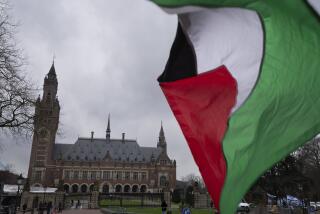Strong Stand on Terrorism
- Share via
The unanimity with which the United Nations recently condemned kidnaping and hostage-taking by terrorists is at least a basis for moving ahead with the struggle to isolate those seeking to win power through heinous crimes against innocent people.
The effectiveness of the resolutions will now depend on the willingness of all nations to respect them. And that may not be easy. Richard Woolcott, the Australian representative on the U.N. Security Council who helped write the council resolution, noted quite correctly that “this will require joint and individual international action to devise and implement comprehensive and practical measures.”
By consensus decision, the U.N. General Assembly acted on Dec. 9 to condemn “as criminal all acts, methods and practices of terrorism wherever and by whomever committed.” Those are nice, strong words, but they are also generalities susceptible to each nation’s convenience and self-interest as it writes its own definition.
Now the Security Council, the 15-nation arm of the world organization that is charged with executing actions to preserve the peace, has voted unanimously to condemn “unequivocally all acts of hostage-taking and abduction,” and to call for the immediate release of all hostages and abducted persons “wherever and by whomever they are being held.” There is more precision in that language, fewer opportunities for deliberate misunderstanding.
“Never have I attended a council meeting where unanimous agreement was reached in such a short time,” Leandre Bassole of Burkina Faso, formerly Upper Volta, the council president, commented. “It proves how urgently we need to solve the problem.”
There seemed little prospect that the action would affect the most conspicuous hostage case, however. Extremists in Lebanon who are holding hostages from the United States, France and Britain and already have murdered some, including a Soviet hostage, appear beyond the reach of the law of any government as they exploit the anarchy that prevails in Lebanon.
Nor did the council action serve as a deterrent to the terrorists who held hostage a French courtroom within hours of the U.N. action.
But it may serve to limit the refuges that have served terrorists in the past.
The complexity of the issue of refuge had been dramatized the day before the U.N. vote when Secretary of State George P. Shultz indirectly criticized Yugoslavia for granting safe passage to Abul Abbas, the Palestine Liberation Front leader accused of masterminding the hijacking of the cruise ship Achille Lauro. The resolution now has a particular relevance for Iraq, where Abbas is thought to have fled.
Even if there is no assurance of a quick effect from the Security Council’s resolution, the unanimity represented in the vote will facilitate the campaign against terrorists. If nothing else, the differences of the past, when those carrying out extralegal activities had been called terrorists by some and freedom fighters by others, have been narrowed by this new agreement that kidnaping and hostage-taking cannot be justified under any circumstances.
More to Read
Sign up for Essential California
The most important California stories and recommendations in your inbox every morning.
You may occasionally receive promotional content from the Los Angeles Times.













